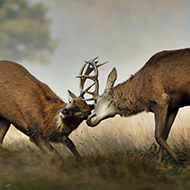Dog owner warning over deer rutting season

Dogs and their owners can be in danger of getting caught in the crossfire if deer are fighting.
Dog owners are being cautioned against taking their pets into places where there are wild deer during the autumn rutting season.
Blue Cross has warned that even if owners believe their dog has a perfect recall, it is still advisable to keep dogs on a lead and as far away as possible from any potential deer.
Female deer are in season for no more than a few hours, and with stags and bucks fighting to preserve their 'hareems', dogs or people coming between a male and female in season are at risk of serious injury, the charity said.
Dogs and their owners can also be in danger of getting caught in the crossfire if deer are fighting or chasing each other away. Not only that, but dogs may run into a road if they give chase, potentially causing a traffic accident and being injured or possibly run over.
Blue Cross animal behaviourist Claire Stallard said: “It’s important to keep control of dogs when near wild animals like deer, especially at this time of year. Also, there will be increased activity during the rutting season and your dog may become excited by the extra noise, smell and movement, so it makes sense to keep your distance.
“Avoid walking your dog in deer parks altogether during this time, there are very large numbers of deer in those areas and the risk to your dog will be greater. If you usually walk in areas where deer prefer to avoid people and your dog is good at coming back when called, it still makes sense to be extra vigilant and keep them close.
“Dogs may chase deer if they unexpectedly run out in front of them which puts them at great risk.”



 The Veterinary Medicines Directorate (VMD) is inviting applications from veterinary students to attend a one-week extramural studies (EMS) placement in July 2026.
The Veterinary Medicines Directorate (VMD) is inviting applications from veterinary students to attend a one-week extramural studies (EMS) placement in July 2026.